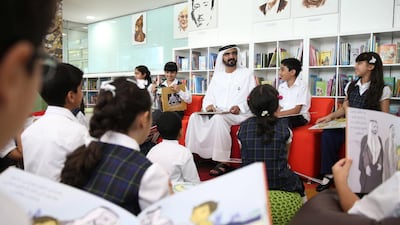DUBAI // Sheikh Mohammed bin Rashid, Vice President and Ruler of Dubai, has set the ambitious goal of getting a million children in the region to read 50 Arabic books each.
Sheikh Mohammed on Wednesday announced the Arab Reading Challenge on his Twitter account, with more than US$3 million (Dh11m) in rewards for teachers, pupils and their families – and $1m for the top school.
“Reading opens minds, magnifies hunger for knowledge and instils the values of openness and moderation that define great civilisations,” he said.
“The Arab World is suffering from a reading crisis whose consequences we see and feel every day in this region.
“The Arab Reading Challenge will inspire one million children each to read 50 books outside the school curriculum in one year. It will be followed by many initiatives. The goal is to create a new generation, a new hope and a new reality.
“We set this challenge for the Arab education sector, Arab parents and Arab children and youth. We have every faith in their abilities to achieve it.”
While launching the campaign at the School of Research Science in Dubai, Sheikh Mohammed surprised the assembled pupils when he launched his own children’s book, Two Heroic Leaders, then read it to them.
The book tells the story of the Founding President Sheikh Zayed, and his own late father, Sheikh Rashid, who achieved their vision of forming a country where children’s dreams come true.
The challenge runs from next month until March next year and has been welcomed among education experts.
Imad Nasr, director of Arabic at Jumeira Baccalaureate School in Dubai, said it was crucial for children to start reading from an early age.
“This is a wonderful initiative from Sheikh Mohammed and I think it will get parents, schools and most importantly, children thinking about this issue,” Mr Nasr said.
“Many children these days spend most of their spare time on iPads or playing video games, and so don’t feel the need to read in Arabic. There is an old Arab proverb that says ‘reading is the key of each science’, and that is very true.”
Jumeira Baccalaureate has introduced a six-level guided Arabic reading programme where children must read 30 books at each level before progressing to the next.
“When I was young my mother always bought me a book on my birthday and I grew up believing the greatest gift one could receive was a book, and that has stayed with me throughout my life,” said Mr Nasr. “Schools can’t do this alone and we need the help of parents, because children spend most of their time with their families.”
The Arab Reading Challenge’s use of incentives to encourage more reading among children would help, he said. The campaign has a range of prizes, with $150,000 for the winning pupil – $100,000 for university fees and $50,000 for their family.
A sum of $300,000 has been set aside for school supervisors and promotional incentives for schools, and more than $1m in rewards for pupils.
Emad Abu Eid, head of Abu Dhabi Municipality’s public libraries unit, said: “You need a big campaign to convince the kids to read more because the most difficult thing is to create the culture of reading.”
Mr Abu Eid urged schools, education organisations and families to get involved.
“It is very important to involve the family because they play a vital role in encouraging kids to read and make it a habit,” he said. Public and school libraries also play an important role by promoting the campaign, Mr Abu Eid said, as did incentives to get children to read.
Once reading becomes a habit, they learn the knowledge they gain is more valuable than any sum of money, he said.
Sheikh Mohammed said developing children’s Arabic reading was part of the country’s vision. “In the UAE, we have always realised the importance of reading and developing Arabic language skills,” he said. “These have been included as indicators in the UAE national agenda for 2021.”
More information about the competition can be found here.
nhanif@thenational.ae
*Additional reporting by Roberta Pennington and Ruba Haza

